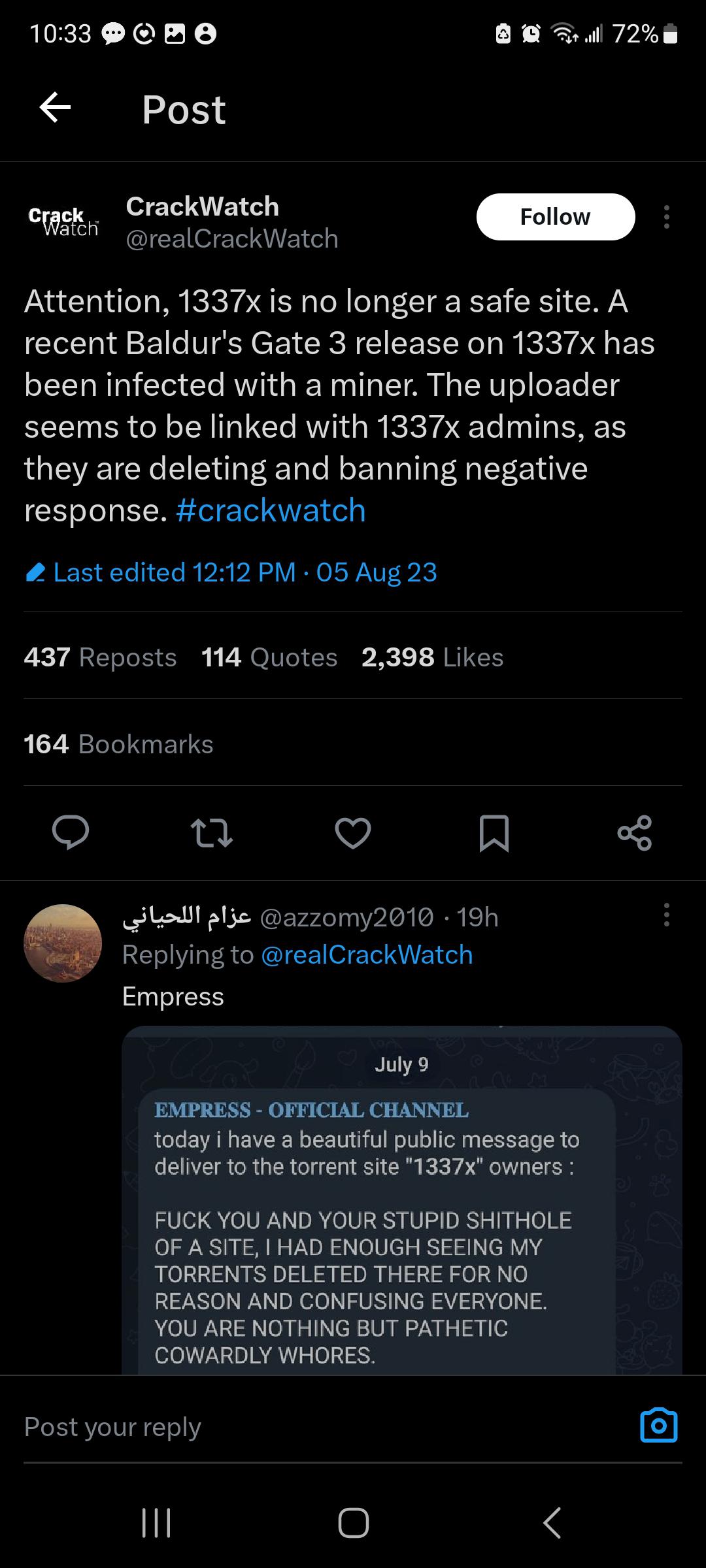this post was submitted on 06 Aug 2023
1137 points (92.8% liked)
Piracy: ꜱᴀɪʟ ᴛʜᴇ ʜɪɢʜ ꜱᴇᴀꜱ
55789 readers
556 users here now
⚓ Dedicated to the discussion of digital piracy, including ethical problems and legal advancements.
Rules • Full Version
1. Posts must be related to the discussion of digital piracy
2. Don't request invites, trade, sell, or self-promote
3. Don't request or link to specific pirated titles, including DMs
4. Don't submit low-quality posts, be entitled, or harass others
Loot, Pillage, & Plunder
📜 c/Piracy Wiki (Community Edition):
💰 Please help cover server costs.
 |
 |
|---|---|
| Ko-fi | Liberapay |
founded 2 years ago
MODERATORS
you are viewing a single comment's thread
view the rest of the comments
view the rest of the comments


I wouldn't trust anything from a P2P site that purports to be:
Movies, audio & books are generally safe providing they use a recognized extension - mp3, mp4, pdf, mkv, aac, flac, epub etc. Stuff that runs under emulation like console games is generally safe. I say "generally" because an exploit could still be crafted to escape a popular media player or emulator and cause actual harm to your computer.
All the ads and 3rd party scripts should be considered malicious too and should be erased with an adblocker, or even better use Tor.
So basically use some common sense and if you really want some game or app, just buy the damned thing or wait for it to go on sale.
WINE is not safe to run malware in, it's not a secure sandbox. AFAIK, anything expecting it can do anything a Linux binary can. (Also, not an emulator, it's in the original name - WINE Is Not an Emulator)
I know what WINE is and the gist of "Wine is not an emulator". I have used it extensively and for a while it even contained some of my code (not sure if it still does). But it is still emulating but not in the way people think. WINE is not emulating the operating system but it is emulating the interface that an executable interacts with Windows, aka the Win32 APIs and other DLLs.
They even touch on this in their FAQ - *That said, Wine can be thought of as a Windows emulator in much the same way that Windows Vista can be thought of as a Windows XP emulator: both allow you to run the same applications by translating system calls in much the same way. Setting Wine to mimic Windows XP is not much different from setting Vista to launch an application in XP compatibility mode. *
As far as a potentially malicious executable is concerned, you can create a throwaway wine folder to run the thing and delete it as soon as it is done, e.g.
e.g.
It doesn't matter if keygen.exe is evil because it can write anything it likes to the fake C: and the fake registry and it's blown away. As a precaution disable networking so it can't reach out either. In the extremely unlikely event that keygen.exe had code to detect it was running under WINE, it would still be subject to the permissions of the uid you had run it as, so you could take even more precautions if you felt so inclined. You could even use a dockerized WINE if you felt like it.
On the topic of whether or not it's an emulator, sounds like semantics in the end - fair enough, I disagree but you make a fair point.
That said, in terms of security I think it's very important to point it out that it isn't any more secure than running a random Linux executable. In my view, the original comment is advocating for running unknown executables under wine as a security measure, and the further argument is that it's more secure because most attacks don't target that.
Sounds like if people rely on that for security, malware will just start targeting that after people get used to assuming it's safe.
I doubt many people are ever going to do what I suggested so the effort / payoff for malware writers makes it very unlikely they'd bother. They'll just assume 99.999% of people running the binary are doing so on Windows and code accordingly. Of course anything is theoretically possible.
wine is a windows api implementation, it's specifically NOT an emulator
Read their own FAQ. It's not an emulator in the classic sense of emulating the OS. It is however emulating the API of Windows. I quoted the pertinent line of the FAQ elsewhere and made my point clearer
Not sure what the thumbs down is about. It's right there in their own FAQ.
In fact it ends by saying - "Wine is not just an emulator" is more accurate.
There is a storied history in computing to use tongue in cheek self referential acronyms to denote some humor and finality in distinguishing things that purposely fill a niche in the world of competing, often pricey, commercial software and other hackable reasons.
So I bet you're rubbing wrong those of us who remember that gnu is not unix, and more specifically wine is not an emulator. Because they really aren't.
This is a piracy community.
You could trivially verify an emulated game with a checksum
If a game is released on GOG, there are Checksums that are hidden from the user. GOG games are DRM-free, so there's no reason anyone would modify the installer.
Are cracked games no good anymore? You used to be able to get just about any cracked game back in the day. Sure, some of them might be malware, but it was easy to find one that wasn't.